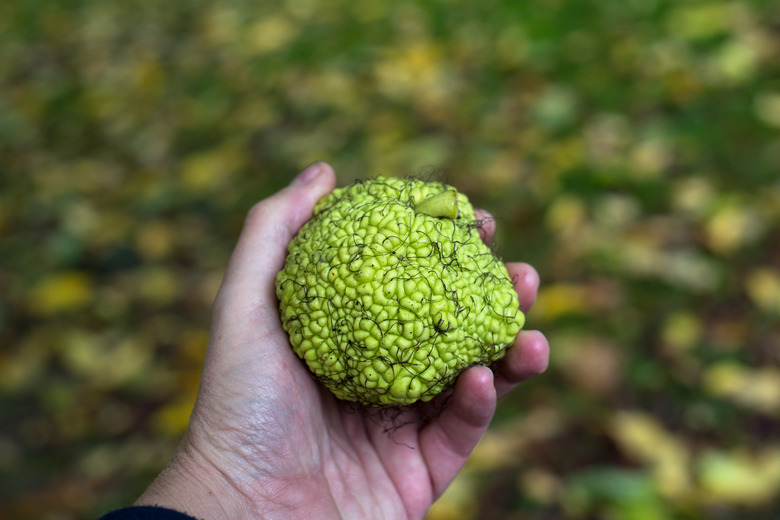Are Hedge Apples Effective Spider Repellents?
We may receive a commission on purchases made from links.
Commonly known as hedge apples, the fruits of the hedge-apple tree, also called Osage orange tree (Maclura pomifera, USDA zones 4-9), supposedly have spider-repelling properties that border on magic. So many people believe that these green, bumpy fruits repel spiders that some grocery stores and farmers' markets stock these "spider balls" every fall even though they're inedible. Although anecdotal tales declare hedge apples an effective spider repellent, scientists suggest you use something else instead.
Hedge Apples as Spider Repellent
Hedge Apples as Spider Repellent
Given that spiders willingly weave their webs on Osage orange trees and on hedge apples themselves, it seems unlikely that the fruit repels spiders. Researchers at Iowa State University wanted the facts, however, and decided to put the Osage orange to the test. The results proved disappointing to everyone but the spiders.
Researchers found that the Osage orange failed to repel spiders but did repel some cockroaches and mosquitoes. The repellent properties came from compounds inside the fruit, however, and were ineffective when the fruit remained whole. It was also noted that the Osage orange was only effective against these insects if large amounts of it were placed in small spaces. Hedge apples simply are not effective for repelling spiders.
Testing Hedge Apples Yourself
Testing Hedge Apples Yourself
If you decide you want to test hedge apples for yourself, there is certainly no harm in trying if you do so carefully. The milky white juice inside hedge apples is a skin irritant, however, so always wear gloves when handling them and keep them away from pets and children. Slice the fruit to release the chemicals contained within and lay the fruit slices around your home's foundation or in your basement.
Lemon, Peppermint, and Chestnuts as Natural Spider Repellents
Lemon, Peppermint, and Chestnuts as Natural Spider Repellents
In addition to hedge apples, an internet search for natural spider repellents will turn up thousands of results claiming that chestnuts naturally repel spiders as will peppermint oil and lemon oil. When tested, peppermint oil and chestnuts did both prove to repel some spiders but worked only on spiders in two families. Lemon oil was completely ineffective as a repellent.
Tips for Keeping Spiders Out of Your Home
Tips for Keeping Spiders Out of Your Home
Although lemon oil and hedge apples may fail you, there are effective ways to reduce the number of spiders who visit your home. Try these proven methods to keep spiders out of your home:
- Use caulk and screening to seal any vents, holes or cracks that allow spiders to wiggle their way inside.
- Reduce the number of spiders you harbor by using outdoor lighting sparingly or with yellow bulbs that attract fewer insects. Spiders themselves aren't attracted to the light, but the insects they feed on are, and the spiders will go where food is easy to find.
- Remove the plants and foliage from your home's foundation. Spiders like to hide in woodpiles, grass clippings, bushes and other plants, so keep some space between your home and these items. Keep tree limbs trimmed away from your home as well so they don't serve as elevated walkways into your home.
If your spider problem is intense, consider getting help from a professional exterminator. If you're concerned about using dangerous chemical deterrents, let them know when you speak to them. The exterminator can help you determine the safest and most effective approach for your home and specific spider issue.
